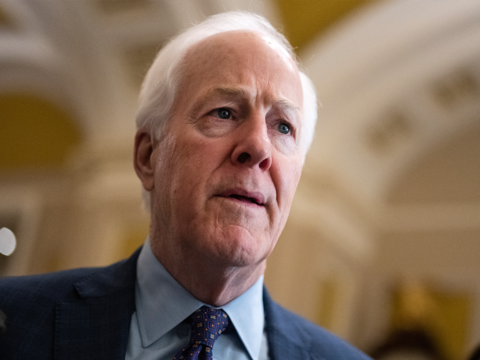Evangelical Christians are the group that is most skeptical of climate change, data shows, but a new generation of believers inside the church is trying to change their minds. Young activists are trying to fight climate denial among their peers and leaders. Adam Yamaguchi reports.
#news #climatechange #religion
“CBS Saturday Morning” co-hosts Jeff Glor, Michelle Miller and Dana Jacobson deliver two hours of original reporting and breaking news, as well as profiles of leading figures in culture and the arts. Watch “CBS Saturday Morning” at 7 a.m. ET on CBS and 8 a.m. ET on the CBS News app.
Subscribe to “CBS Mornings” on YouTube: https://www.youtube.com/CBSMornings
Watch CBS News live: https://cbsn.ws/1PlLpZ7c
Download the CBS News app: https://cbsn.ws/1Xb1WC8
Follow “CBS Mornings” on Instagram: https://bit.ly/3A13OqA
Like “CBS Mornings” on Facebook: https://bit.ly/3tpOx00
Follow “CBS Mornings” on Twitter: https://bit.ly/38QQp8B
Subscribe to our newsletter: https://cbsn.ws/1RqHw7T
Try Paramount+ free: https://bit.ly/2OiW1kZ
For video licensing inquiries, contact: licensing@veritone.com
** (Disclaimer: This video content is intended for educational and informational purposes only) **





















![Suspects for Looting/Commercial Burglary in the 2nd District [VIDEO] – Blotter](https://www.phillynewsnow.com/wp-content/uploads/2023/10/Looting-Commercial-Burglary-5200-Whitaker-Ave-DC-23-02-045070-100x100.jpg)
freemasons using young innocent people thinking they have the latest right info when they don't realise the religion and history is all made up. Christianity can now be debunked in 1 hour by tovia singer and history debunked by the mud flood and tartarian buildings everywhere. Climate change is weather manipulation by technology held in ancients time not revealed. We are truly living in the end times and the war in israel has finally began and the race for the temple in jerusalem shall be realised. May HAshem our Creator return soon.
Root cause of global warming is a spy satellite that created a feeding frenzy, every person is eating 3 times as much food because of it.
They should be preaching this in China and India since they are the largest polluters.
Who is behind this? We need fossil fuels to survive. Forever. Solar and wind are not enough. Just wait until you have a cold cloudy winter day. Where is the heat from solar or wind? There is none. Never will be heat.
You'd think if God was so great, he would've designed a climate that wasn't so fragile.
Or, y'know, put the solution in the bible right next to the blueprints for microprocessors and antibiotics.
Wait…
35 years ago we were supposed to run out of "fossil fuels" in 5-10 years. What happened?
Climate change is not settled science. Furthermore as a Christian, the bible states the ending will be when Jesus returns, not through a climate crisis.
If I could help in anyway, please keep in touch. Ever time I hear or see a Creole My spirit jumps. Thanks for your work and love.
Sounds about right since it is a religion not based in any actual science, starting with the actual climate history of the world 9 warming/cooling cycles in 9000 years, caused by no one and fixed by no one.
Wait wait globalist elite pollute more than average american but they are exempted.. climate change is a simply myth for top 1% to control people
As Christians, we should be concerned about our effect on our environment. God appointed humanity to be the steward of this world (Genesis 1:28), not the destroyer of it. However, we should not allow environmentalism to become a form of idolatry, where the “rights” of an inanimate planet and its non-human creatures are held in higher esteem than God (Romans 1:25) and humanity created in His image. With global warming, as with any other topic, it is crucial to understand what the facts are, from whom those facts come, how they are interpreted, and what the spiritual implications are.
A careful look at global warming, as a topic, shows that there is a great deal of disagreement about the facts and substance of climate change. Those who blame humanity for climate change often disagree about what facts lead them to that conclusion. Those who hold humanity totally innocent of it often ignore established facts. Experience and research leads us to believe that warming is, in fact, occurring; however, there is little to no objective evidence that humanity is the cause, nor that the effects will be catastrophic. The idea of earth “wearing out” is an apt analogy. This entire world has been continually decaying since the fall.
Global warming “facts” are notoriously hard to come by. One of the few facts universally agreed upon is that the current average temperature of Earth is indeed rising at this time. According to most estimates, this increase in temperature amounts to about 0.4-0.8 °C (0.72-1.44 °F) over the last 100 years. Data regarding times before that is not only highly theoretical but very difficult to obtain with any accuracy. The very methods used to obtain historical temperature records are controversial, even among the most ardent supporters of the theory of human-caused climate change. The facts leading one to believe that humans are not responsible for the current change in temperature are as follows:
• Global temperature changes from past millennia, according to available data, were often severe and rapid, long before humanity supposedly had any impact at all. That is, the current climate change is not as unusual as some alarmists would like to believe.
• Recent recorded history mentions times of noticeable global warming and cooling, long before humanity had any ability to produce industrial emissions.
• Water vapor, not CO2, is the most influential greenhouse gas. It is difficult to determine what effect, if any, mankind has on worldwide water vapor levels.
• Given the small percentage of human-produced CO2, as compared to other greenhouse gases, human impact on global temperature may be as little as 1%.
• Global temperatures are known to be influenced by other, non-human-controlled factors, such as sunspot activity, orbital movement, volcanic activity, solar system effects, and so forth. CO2 emission is not the only plausible explanation for global warming.
• Ice Age temperature studies, although rough, frequently show temperatures changing before CO2 levels, not after. This calls into question the relationship between warming and carbon dioxide; in some cases, the data could easily be interpreted to indicate that warming caused an increase in carbon dioxide, rather than the reverse!
• Computer simulations used to “predict” or “demonstrate” global warming require the assumption of human causation, and even then are not typically repeatable or reliable. Current computer weather simulations are neither predictive nor repeatable.
• Most of the global temperature increase of the last 100 years occurred before most of the humanity-made CO2 was produced.
• In the 1970s, global temperatures had actually been dropping since 1945, and a “global cooling” concern became prominent, despite what is now dismissed as a lack of scientific support.
• The “consensus” claimed by most global warming theorists is not scientific proof; rather, it is a statement of majority opinion. Scientific majorities have been wrongly influenced by politics and other factors in the past. Such agreement is not to be taken lightly, but it is not the same thing as hard proof.
• This “consensus,” as with many other scientific theories, can be partially explained by growing hostility to those with differing viewpoints, making it less likely that a person without preconceived notions would take on the subject for research. The financial and political ramifications of the global warming debate are too serious to be ignored, though they should not be central to any discussion.
• The data being used to support anthropogenic (humanity-caused) global warming is typically based on small data sets, single samples, or measurements taken in completely different regions. This creates an uncertainty in the results that rarely gets the attention that alarmist conclusions do.
While the above list is not exhaustive, it does include several of the major points that raise doubts about mankind’s actual effect on global temperatures. While no one can deny that warming is occurring, “overwhelming evidence” of any objective type does not exist to support the idea that global warming is significantly influenced by human actions. There is plenty of vague, short-sighted, and misunderstood data that can be seen as proving “anthropogenic” global-warming theory. All too often, data used to blame humans for global warming is far less reliable than data used for other areas of study. It is a valid point of contention that the data used in these studies is frequently flawed, easily misinterpreted, and subject to preconception.
In regards to issues such as this, skepticism is not the same as disbelief. There are fragments of evidence to support both sides, and logical reasons to choose one interpretation over another. The question of anthropogenic global warming should not divide Christian believers from each other (Luke 11:17). Environmental issues are important, but they are not the most important questions facing mankind. Christians ought to treat our world with respect and good stewardship, but we should not allow politically driven hysteria to dominate our view of the environment. Our relationship with God is not dependent on our belief in human-caused global warming.
There is a difference between the biblical view of the environment and the political movement known as "environmentalism." Understanding this difference will shape a Christian’s view of environmentalism. The Bible is clear that the earth and everything in it was given by God to man to rule over and subdue. "And God blessed them, and God said to them, 'Be fruitful and multiply, and fill the earth and subdue it; and have dominion over the fish of the sea and over the birds of the air and over every living thing that moves upon the earth'" (Genesis 1:28).
Because mankind was created in His image, God gave men and women a privileged place among all creatures and commanded them to exercise stewardship over the earth (Genesis 1:26-28; Psalm 8:6-8). Stewardship implies caretaking, not abusing. We are to intelligently manage the resources God has given us, using all diligent care to preserve and protect them. This is seen in the Old Testament where God commanded that the fields and vineyards would be sown and harvested for six years, then left fallow for the seventh year in order to replenish the soil’s nutrients, both to rest the land and to ensure continued provision for His people in the future (Exodus 23:10-11; Leviticus 25:1-7).
In addition to our role of caretakers, we are to appreciate the functionality and beauty of the environment. In His incredible grace and power, God has placed on this planet everything needed to feed, clothe, and house the billions of people who have lived on it since the Garden of Eden. All the resources He has provided for our needs are renewable, and He continues to provide the sun and rain necessary to sustain and replenish those resources. And, as if this were not enough, He has also decorated the planet in glorious color and scenic beauty to appeal to our aesthetic sense and thrill our souls with wonder. There are countless varieties of flowers, exotic birds, and other lovely manifestations of His grace to us.
At the same time, the earth we inhabit is not a permanent planet, nor was it ever intended to be. The environmental movement is consumed with trying to preserve the planet forever, and we know this is not God’s plan. He tells us in 2 Peter 3:10 that at the end of the age, the earth and all He has created will be destroyed: "But the day of the Lord will come like a thief, and then the heavens will pass away with a loud noise, and the elements will be dissolved with fire, and the earth and the works that are upon it will be burned up" (NKJV). The physical, natural earth in its present form, with its entire universe will be consumed, and God will create a "new heaven and a new earth" (2 Peter 3:13; Revelation 21:1).
So we see that, rather than trying to preserve the earth for thousands or even millions of years to come, we are to be good stewards of it for as long as it lasts, which will be as long as it serves God’s sovereign plan and purpose.
It is interesting to note how the phrase "climate change" is replacing "global warming" as the catch phrase of environmentalism. Some scientists/climatologists are certain that human activity, primarily greenhouse gas emissions, is impacting the environment. What they are not certain about is precisely what the impact will be. A couple of decades ago, "global cooling" was the fear, with warnings of a new ice age being the primary scare tactic. While most scientists/climatologists today believe that global warming is the primary risk, uncertainty has led to "climate change" being used as a less specific warning. Essentially, the climate change message is this: greenhouse gas emissions are damaging the environment, and, while we are not certain what the effect will be, we know it will be bad.
Climatologists, ecologists, geologists, etc., are unanimous in recognizing that the earth has gone through significant temperature/climate changes in the past. Despite the fact that these climate changes were obviously not caused by human activity, many of these same scientists are convinced that human activity is the primary cause of climate change today. Why? There seem to be three primary motivations.
First, some truly and fully believe the greenhouse gas emissions are causing climate change. They honestly examine the data and come to that conclusion. Second, some hold to the climate change mindset with an almost religious fervor. Many within the environmentalist movement are so obsessed with protecting "Mother Earth" that they will use any argument to accomplish that goal, no matter how biased and unbalanced it is. Third, some promote the climate change mentality for financial gain. Some of the strongest proponents of climate change legislation are those who stand to have the greatest financial gain from "green" laws and technologies. Before the climate change mindset is accepted, it should be recognized that not everyone who promotes climate change is doing so from an informed foundation and pure motives.
How, then, should a Christian view climate change? We should view it skeptically and critically, but at the same time honestly and respectfully. Most importantly, though, Christians should look at climate change biblically. What does the Bible say about climate change? Not much. Likely the closest biblical examples of what could be considered climate change would be the end times disasters prophesied in Revelation 6–18. Yet these prophecies have nothing to do with greenhouse gas emissions; rather, they are the result of the wrath of God, pouring out justice on an increasingly wicked world. Also, a Christian must remember that God is in control and that this world is not our home. God will one day erase this current universe (2 Peter 3:7-12) and replace it with the New Heavens and New Earth (Revelation 21–22). How much effort should be made "saving" a planet that God is eventually going to obliterate and replace with a planet so amazing and wonderful that the current earth pales in comparison?
Is there anything wrong with going green? No, of course not. Is trying to reduce your carbon footprint a good thing? Probably so. Are renewable energy sources worth pursuing? Of course. Are any of these things to be the primary focus of followers of Jesus Christ? Absolutely not! As Christians, our focus should be proclaiming the truth of the gospel, the message that has the power to save souls. Saving the planet is not within our power or responsibility. Climate change may or may not be real, and may or may not be human-caused. What we can know for certain is that God is good and sovereign, and that Planet Earth will be our habitat for as long as God desires it to be. Psalm 46:2-3, "Therefore we will not fear, though the earth give way and the mountains fall into the heart of the sea, though its waters roar and foam and the mountains quake with their surging."
The former weather channel owner from years past, maybe probably five years ago when he resigned, but before he said himself there was no such thing as climate change, so they got rid of him.
Most of the so called climate change panic mongers need to actually take the time to fully research the entire subject before making all their simpletons statements
I do not worship the earth.
I do not believe politicians tell the truth. The god of this world is their god.
We should care for the earth. But do not trust in politicians to do so. Go to the manufacturer and follow his instructions.
Neither do i believe a climate model that was designed to ignore the effectiveness s of the sun
Or a consensus that (in north america) was voted on by 13 people. Only.
Caring for the planet is important no matter what your belief.
There is no objective observational evidence that we are living in a global climate crisis.
The UN's IPCC AR6, chapter 12 "Climate Change Information for Regional Impact and for Risk Assessment", section 12.5.2, table 12.12 confirms there is a lack of evidence or no signal that the following have changed:
Air Pollution Weather (temperature inversions),
Aridity,
Avalanche (snow),
Average precipitation,
Average Wind Speed,
Coastal Flood,
Agricultural drought,
Hydrological drought,
Erosion of Coastlines,
Fire Weather (hot and windy),
Flooding From Heavy Rain (pluvial floods),
Frost,
Hail,
Heavy Rain,
Heavy Snowfall and Ice Storms,
Landslides,
Marine Heatwaves,
Ocean Acidity,
Radiation at the Earth’s Surface,
River/Lake Floods,
Sand and Dust Storms,
Sea Level,
Severe Wind Storms,
Snow, Glacier, and Ice Sheets,
Tropical Cyclones.
There is no objective observational evidence that we are living through a global climate crisis. None.
Use of fosil fuel helps to keep natural equilibrium.
Well, at least CBS is admitting that this is a religion.
Yes, the "believers" are being organized to "tackle" the heretics.